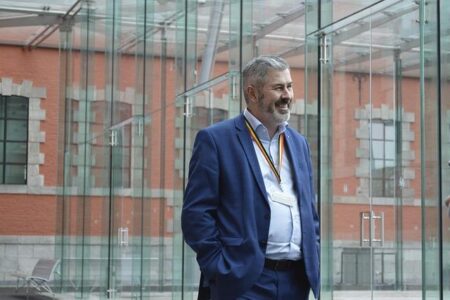San Antonio Lawmaker Raises Alarm Over Trump-Endorsed Bill Affecting Education, Clean Energy, and Healthcare
Joaquin Castro, the Congressman representing San Antonio, has expressed strong reservations about a legislative proposal championed by former President Donald Trump, which Trump himself has labeled a “big, bad bill.” Castro warns that this legislation could trigger widespread adverse effects, particularly jeopardizing college studentsŌĆÖ access to education, undermining clean energy progress, and threatening the viability of healthcare institutions in underserved areas.
CastroŌĆÖs primary concerns include:
- Decreased financial support for higher education, potentially leading to higher dropout rates and limiting opportunities for economically disadvantaged students.
- Scaling back of renewable energy incentives, which could stall TexasŌĆÖ transition toward sustainable energy sources.
- Potential shutdowns of essential hospitals in rural and low-income communities, worsening healthcare disparities.
| Sector | Possible Outcome |
|---|---|
| Higher Education | Cuts to scholarships and research funding |
| Clean Energy | Reduced investment and elimination of tax incentives |
| Healthcare | Hospital closures and diminished emergency care |
How the Bill Threatens Clean Energy Progress in Texas
Environmental groups and energy sector analysts have voiced serious concerns about the billŌĆÖs potential to derail TexasŌĆÖ clean energy advancements. The legislation proposes cuts to vital tax credits that currently support solar and wind energy projects, which could slow the stateŌĆÖs efforts to reduce greenhouse gas emissions. This comes at a time when Texas is among the top U.S. states for renewable energy capacity, with wind power alone accounting for over 25% of the stateŌĆÖs electricity generation as of 2023.
Moreover, the bill threatens to slash funding for research and development in clean technologies, which could stifle innovation and job creation in a rapidly growing sector. Experts warn that these measures may discourage startups focused on green energy solutions and delay critical upgrades to the electrical grid needed to accommodate renewable sources.
| Clean Energy Component | Expected Impact |
|---|---|
| Renewable Energy Tax Credits | Elimination or reduction, slowing new installations |
| Energy Innovation Grants | Severe budget cuts, limiting technological advances |
| Green Job Market | Potential decline due to reduced funding |
| Grid Infrastructure Upgrades | Postponed or canceled projects |
The broader consequences could include increased pollution-related health problems and economic downturns in communities dependent on clean energy employment. Critics argue that the bill undermines TexasŌĆÖ leadership in the nationwide shift toward sustainable energy solutions.
Hospital Closures and Healthcare Access Under Threat
Healthcare advocates and local officials have raised alarms about the billŌĆÖs potential to force the closure of multiple hospitals across Texas, particularly in rural and economically disadvantaged regions. Such closures would severely limit access to essential medical services, forcing patients to travel long distances for emergency care and routine treatments.
Highlighted concerns include:
- Reduction in inpatient capacity, leading to overcrowding in remaining facilities
- Job losses in the healthcare sector, impacting local economies and workforce stability
- Disruption of preventive care and chronic disease management programs
| Area | Hospitals at Risk | Estimated Number of Patients Affected |
|---|---|---|
| South Texas | 5 | 8,000+ |
| West Texas | 3 | 4,500+ |
| Central Texas | 4 | 7,200+ |
Community leaders emphasize that these closures would have ripple effects beyond healthcare, potentially impacting educational opportunities and environmental programs due to the interconnected nature of public services. The situation underscores the urgent need for policies that safeguard equitable access to healthcare and support community resilience.
Call for Legislative Reform to Support Vulnerable Populations and Sustainability
Congressman Joaquin Castro has called for urgent revisions to the proposed legislation, highlighting its potential to dismantle vital support systems for TexasŌĆÖ most vulnerable residents. He stresses that the billŌĆÖs provisions could severely limit healthcare access in rural areas, disproportionately affecting low-income and marginalized communities.
Castro also points out that the bill threatens to curtail financial aid programs critical for low-income college students, thereby restricting their ability to pursue higher education and improve their socioeconomic status. These cuts risk unraveling the social safety net that many Texans depend on.
Furthermore, the legislation endangers ongoing clean energy projects that are essential for combating climate change and fostering economic growth. Castro warns that reducing investments in renewable energy could:
- Hinder job creation in emerging green industries
- Increase reliance on fossil fuels
- Undermine TexasŌĆÖ position as a leader in national sustainability efforts
| Sector | Likely Outcome | Communities Most Affected |
|---|---|---|
| Healthcare | Hospital shutdowns | Rural populations |
| Education | Decreased financial aid | Low-income students |
| Clean Energy | Funding reductions | Local economies reliant on green jobs |
Summary and Future Outlook
As discussions around the proposed legislation continue, Congressman Joaquin CastroŌĆÖs critiques underscore the billŌĆÖs potential to inflict significant harm on TexasŌĆÖ educational institutions, healthcare infrastructure, and clean energy progress. With mounting concerns from various stakeholders, the coming months will be critical in determining the stateŌĆÖs trajectory in these vital areas. Texas Public Radio remains committed to tracking these developments and providing timely updates on the billŌĆÖs impact and legislative outcomes.




